What Mini 3D Printers Are Available on the Market in 2023?
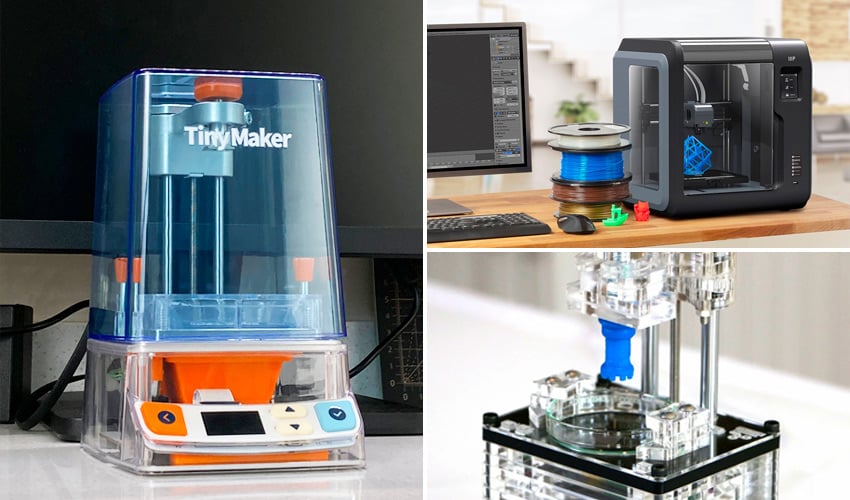
3D printing is becoming increasingly popular. Not only is additive manufacturing on the rise at an industrial level, but many are also trying their hand at 3D printing at home. The problem with this is that some printers are very bulky and take up a lot of space. Beginners in particular generally are hoping to make small prints for their own use, such as prototypes, decorations or smaller usable parts, and thus need small, compact 3D printers. Considering that many commercially available printers have a print bed of at least of 200 x 200 mm, the machine itself often takes up a lot of space due to its size. But, 3D printers with a smaller print bed are more difficult to spot. We have taken a closer look at some printers for mini-prints that are suitable for a build plate of 150 x 150 mm or smaller, including cheap options. We have also taken a look at exciting projects for true mini 3D printers that can print tiny parts. Check out our list and let us know what you think.
Easythreed X1 Mini 3D Printer
The Easythreed X1 Mini 3D printer is a small and portable machine that is very competitive priced (only about 100 euros, though it should be noted that very few are available for sale). With a print volume of 100 x 100 x 100 mm, it is often the choice for makers who want to print small objects and easily transport their machine. In fact, with its small footprint and weight of only 1.3 kg, the X1 Mini is a 3D printer that can be transported to print wherever you want or can fit in any corner of your home. Compatible with PLA filaments, it would appear to be able to process TPU as well. In addition, it is a machine that can provide decent quality prints, thanks to the layer thickness between 50 and 300 microns, which makes it a small, but quite accurate 3D printer.
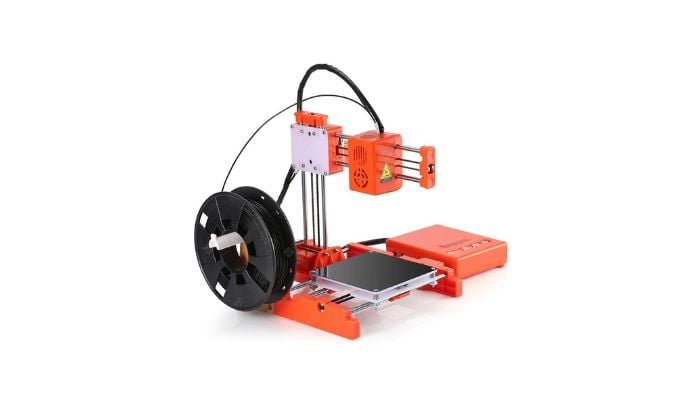
Photo Credits: Easythreed
The Tina2, an Easy-to-Use Solution from Entina
The Tina2 is an easy-to-use mini 3D printer that has been designed for all those novice users who want to get started in the world of additive manufacturing. It has been developed by Entina, who claim that, thanks to this small size solution, the difficulty of learning the 3D printing process is greatly reduced. Weighing 3kg, this material extrusion technology (FFF/FDM) machine allows the creation of parts with a maximum size of 100 x 120 x 100 mm. Among other notable features, the Tina2 has automatic leveling of the printing tray, as well as a 2.4″ LCD screen to control the parameters and start the manufacturing process. Finally, its compatibility with Wiibuilder cutting software makes it easy to use offline using a MicroSD card. We included it on our list of mini 3D printers as well since it allows users to unleash their creativity and enjoy 3D printing with ease!
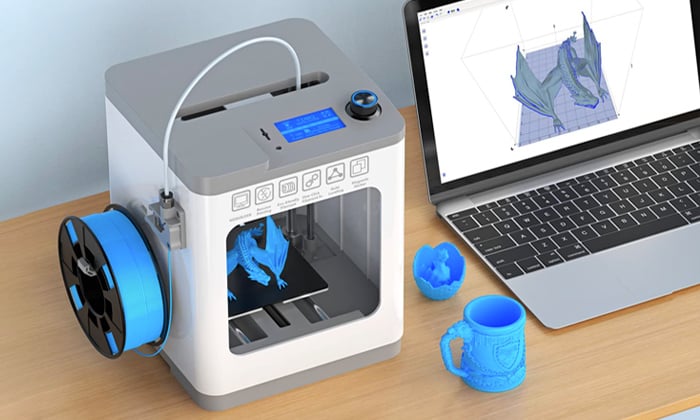
Photo Credits: Entina
Monoprice MP Voxel 3D
The MP Voxel is a small printer that also has attracted attention thanks to its features and how much is included despite its small size. It is a 3D printer ready for everyone with a small color touch screen, an assisted leveling system and the nozzle can be changed in seconds without tools, which makes it perfect for beginners to take their first steps in 3D printing. Among its long list of features we can mention its 8GB memory to store internal models, its ability to connect via Wi-Fi to all kinds of devices and a camera that monitors the printing so that there are no unforeseen events. This small machine comes fully assembled, allowing you to make use of its small 150x150x150mm printing platform right out of the box.
TinyMaker, a 3D printer That Fits in the Palm of Your Hand
Still at the project stage, the TinyMaker is a mini resin 3D printer from the eponymous manufacturer. Open-source, it offers a print volume of 30.6 x 40.8 x 60 mm for a machine size of just 100 x 115 x 155 mm. No wonder it’s so easy to hold in your hand! In fact, this is the manufacturer’s desire to make 3D printing even more accessible. The TinyMaker uses MSLA technology and can be supplied with its own post-processing solutions, namely a cleaning station and a heat treatment machine, both just as compact as the 3D printer. As yet, the TinyMaker has not been delivered to participants in the crowdfunding platform; we’re waiting to find out whether it’s a flop or a success.
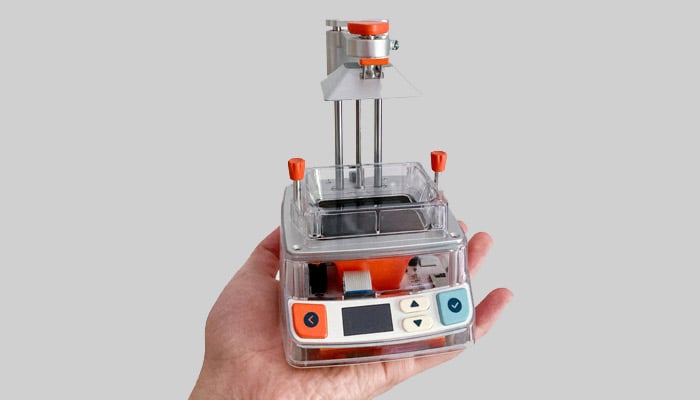
Photo Credits: TinyMaker
My N Mi’s Match-Sized 3D Printer
In February 2023, YouTube creator My N Mi uploaded a video with what they dubbed was the world’s smallest 3D printer. With painstaking details made by hand, the entire device is smaller than the length of a matchstick or microSD card. The tiny SLA machine only has a volume of 11 x 11 x 17 mm and was able to produce small, detailed objects, however the resin must be added manually with a syringe to prevent spilling. While not a commercially available product, the 3D printing community was still taken in by My N Mi’s creation as it showcased the possibilities available when 3D printing with small parts.
Lite3DP S1, an MSLA Mini 3D Printer From New-Mexico
The S1 from Albuquerque-based company Lite3DP is a successfully crowdfunded, small-scale MSLA 3D printer which is designed to be the simplest 3D printer to build and operate. The documentation and specifications are all open source, allowing for beginners to get started right away while experienced users are able to customize their setup as they see fit. With a build volume of 45.1 x 33.8 x 70 mm, the little, lightweight printer is focused on precise, small creations. While the original S1 was released in 2020, there is a new Gen 2 model currently in the crowdfunding phase.
Tiny Boy, the Mini 3D Printer for Students
Another solution on our list for tiny AM solutions is the Mini Fabrikator 3D printer from Tiny Boy which was invented by Parker Leung, the founder of the Tiny Boy project. Leung came up with the idea because he wanted small, practical 3D printers in classrooms for every student. As such, he designed the Tiny Boy to be both small and relatively affordable at less than €170. It can also be easily operated by anyone, anywhere and fits into even the smallest corner of the desk due to an overall size of 150 x 150 x 220 mm. Moreover, it is capable of printing parts with a maximum volume of 80 x 80 x 80 mm. This is perfectly adequate for most small models and other small parts. The Tiny Boy uses 1.75 mm PLA filament (not ABS). It is available in transparent orange or green color.
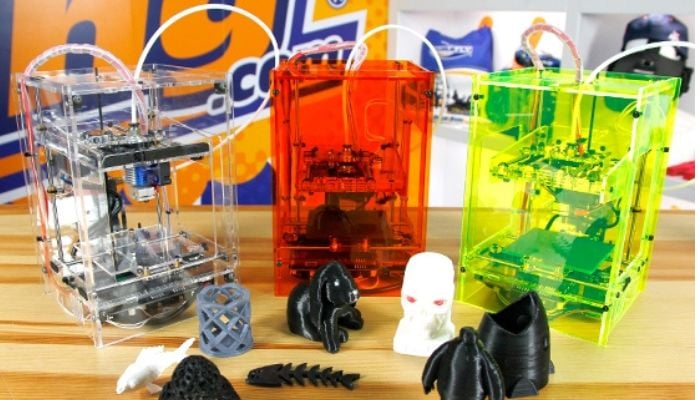
Photo Credits: helicomicro
PicoFab, an Ultra-Compact LCD Printer
The PicoFab is a project initiated by Lumi Industries CEO Davide Marin. He wanted to design an ultra-compact LCD printer that delivers outstanding print quality despite its small size. The PicoFab is therefore a very small desktop resin printer that delivers detailed prints quickly. The printer is compatible with all commercially available 450nm resins and 15-20ml of resin should be sufficient for one print. The printed objects can have a maximum size of 24 x 24 x 50mm and a resolution of 100um on the horizontal axis and 25-50um on the vertical axis. The PicoFab can be used to produce prints for various applications, such as dental applications, jewelry, mechanical parts, miniatures and small prototypes. Needless to say, the PicoFab is not intended for large parts or series production. However, it will be available at a low price and is aimed at a wide range of users. The official release date has not yet been announced by Lumi Industries.
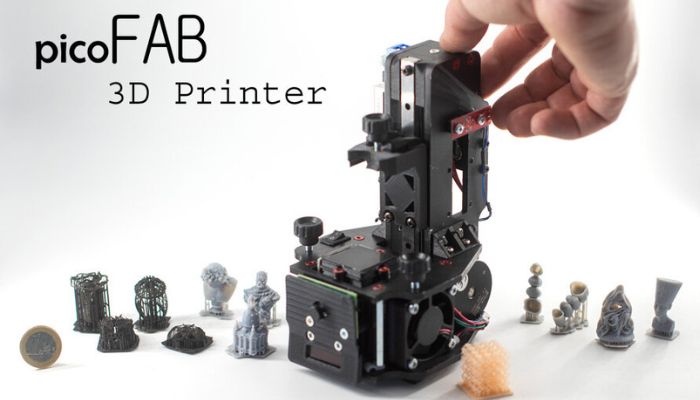
Photo Credits: Lumi Industries
iBox Nano, the World’s Smallest Resin 3D Printer
The iBox Nano is the world’s smallest and cheapest resin printer. This little machine is out of the ordinary when it comes to 3D printers. In addition to being incredibly small, with a printing area of 90 x 100mm, it is quiet, lightweight and battery operated. Indeed, you read that right, it is the first battery-powered 3D printer on the market. The iBox Nano is equipped with Wi-Fi so you can send your designs from any device, it also uses LED light instead of DLP to cure the resin as it has a longer lifespan and heats up less. It is worth mentioning that in case you do not have batteries at home you can always charge it with a USB cable as if it were a cell phone.
What do you think of this list of mini 3D printers? Let us know in a comment below or on our LinkedIn, Facebook, and Twitter pages! Don’t forget to sign up for our free weekly Newsletter here, the latest 3D printing news straight to your inbox! You can also find all our videos on our YouTube channel.






